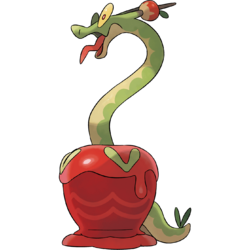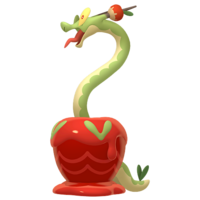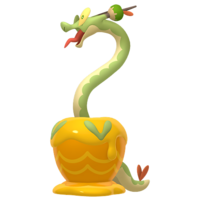From Bulbapedia, the community-driven Pokémon encyclopedia.
|
|
| Line 321: |
Line 321: |
| |zh_cmn=蛇蟲蟲 / 蛇虫虫 ''Shéchóngchóng''|zh_yuemeaning=From {{tt|蛇 ''sèh''|snake}} and {{tt|蟲 ''chùhng''|bug}} | | |zh_cmn=蛇蟲蟲 / 蛇虫虫 ''Shéchóngchóng''|zh_yuemeaning=From {{tt|蛇 ''sèh''|snake}} and {{tt|蟲 ''chùhng''|bug}} |
| }} | | }} |
| | {{-}} |
|
| |
|
| ==Related articles== | | ==Related articles== |
Revision as of 05:07, 20 February 2024
Hydrapple (Japanese: カミツオロチ Kamitsuorochi) is a dual-type Grass/Dragon Pokémon introduced during Generation IX, in The Hidden Treasure of Area Zero Part 2: The Indigo Disk.
It evolves from Dipplin when leveled up while knowing Dragon Cheer. It is one of Applin's final forms, the others being Flapple and Appletun.
Biology

Five of Hydrapple's syrpents
Hydrapple is a Pokémon composed of seven symbiotic creatures known as "syrpents" living within an apple completely made of red syrup. Each syrpent has green, leaf-shaped eyestalks with yellow eyes; a long green body with a pale yellow underbelly; and a tail tipped with leafy green ornaments.
Three of the seven syrpents are always visible outside of the syrup apple: the dominant syrpent's head rises from the center of the apple, and two of the syrpents' tails emerge from its rear. The central, dominant syrpent has the longest body and is further distinguished by its two horns.[1] The left horn has an apple impaled on it. The four other syrpents composing Hydrapple are usually hidden within the syrup, with only the tops of their closed eyestalks visible from without. Sometimes, the four hidden syrpents emerge from the syrup so that five of Hydrapple's heads are visible.
The syrpents that form Hydrapple have inconstant and fickle temperaments. Due to this, the seven syrpents rarely work together as a team. This also prevents Hydrapple from unleashing both full potential and full power. On the rare occasion that the syrpents' moods align, Hydrapple reaches its full potential.
Hydrapple and its pre-evolved form, Dipplin, are the only known Pokémon capable of learning the move Syrup Bomb and the only known Pokémon that can have Supersweet Syrup as an Ability. Also, Hydrapple is the only known Pokémon capable of learning the move Fickle Beam.
Evolution
Hydrapple evolves from Dipplin and is one of the final forms of Applin.
(For specifics on this Pokémon's evolution in the games, refer to Game data→Evolution data.)
In the anime
Major appearances
Minor appearances
In the manga
In the TCG
- Main article: Hydrapple (TCG)
Game data
Pokédex entries
| This Pokémon was unavailable prior to Generation IX.
|
| Generation IX
|
|
Paldea
#—
|
|
Kitakami
#—
|
|
Blueberry
#163
|
| Scarlet
|
Seven syrpents live inside an apple made of syrup. The syrpent in the center is the commander.
|
| Violet
|
These capricious syrpents have banded together. On the rare occasion that their moods align, their true power is unleashed.
|
|
|
Game locations
| This Pokémon was unavailable prior to Generation IX.
|
|
|
In side games
Held items
Stats
Base stats
| Stat
|
Range
|
| At Lv. 50
|
At Lv. 100
|
106
|
|
166 - 213
|
322 - 416
|
80
|
|
76 - 145
|
148 - 284
|
110
|
|
103 - 178
|
202 - 350
|
120
|
|
112 - 189
|
220 - 372
|
80
|
|
76 - 145
|
148 - 284
|
44
|
|
44 - 105
|
83 - 205
|
Total: 540
|
Other Pokémon with this total
|
- Minimum stats are calculated with 0 EVs, IVs of 0, and (if applicable) a hindering nature.
- Maximum stats are calculated with 252 EVs, IVs of 31, and (if applicable) a helpful nature.
|
Type effectiveness
| Under normal battle conditions in Generation IX, this Pokémon is:
|
|
|
|
|
|
|
|
|
|
|
|
|
Learnset
Hydrapple is available in Scarlet and Violet Version 3.0.0+.
|
|
|
|
- Bold indicates a move that gets STAB when used by Hydrapple
- Italic indicates a move that gets STAB only when used by an Evolution of Hydrapple
|
|
|
|
|
- Bold indicates a move that gets STAB when used by Hydrapple
- Italic indicates a move that gets STAB only when used by an Evolution or an alternate form of Hydrapple
|
|
|
|
|
- Moves marked with an asterisk (*) must be chain bred onto Hydrapple
- Bold indicates a move that gets STAB when used by Hydrapple
- Italic indicates a move that gets STAB only when used by an Evolution of Hydrapple
|
|
|
|
|
- Bold indicates a move that gets STAB when used by Hydrapple
- Italic indicates a move that gets STAB only when used by an Evolution of Hydrapple
|
Side game data
Pokémon GO
| File:GO1019.png
|
Base HP: 235
|
Base Attack: 216
|
Base Defense: 186
|
| Egg Distance: N/A km
|
Buddy Distance: 5 km
|
Evolution Requirement: N/A
|
| Fast Attacks:
|
| Charged Attacks:
|
|
|
Evolution data
Sprites
| This Pokémon was unavailable prior to Generation IX.
|
|
|
Trivia
- Hydrapple is the only one of Applin's evolutionary relatives to be a third-stage evolution.
- Hydrapple appears in the Blueberry Pokédex, despite none of its evolutionary relatives appearing in it, also making it the only member of Applin's evolutionary relatives with this distinction.
- Dipplin and Hydrapple are the only evolutionary relatives introduced within a single generation that are not next to each other in National Pokédex order, with Dipplin being number 1011 and Hydrapple being number 1019.
- Hydrapple's existence was indicated before the release of The Indigo Disk by the fact that Dipplin could use the Eviolite.
- Hydrapple is the only Pokémon that requires a TM to obtain, as Dipplin cannot learn Dragon Cheer without it.
- As Dynamax and Gigantamax are exclusive to Pokémon Sword and Shield, Hydrapple is the only one of Applin's final forms to not have a Gigantamax form.
Origin
Hydrapple seems to be inspired by multiheaded serpent-like monsters from various myths, such as the Yamata no Orochi, an eight-headed dragon or serpent from Japanese mythology; Hachirō-Tarō or Hachi no Tarō no Daija (where daija is an alternative reading of orochi), a similar creature in the local myths of Northern Tōhoku, which Kitakami is based on; the Lernaean Hydra, a many-headed serpentine monster from Greek mythology; and Ladon, the multi-headed dragon from Greek mythology that guarded the golden apples in the Garden of the Hesperides, historically said to be located in the Iberian Peninsula or the Canary Islands. The fact that the syrpents' moods rarely align may be a reference to the golden Apple of Discord. Like its evolutionary relatives, Hydrapple also appears to be based on the popular image of a worm burrowing into an apple, as well as a pun on the wyrm, a type of dragon — hence its Dragon typing. It also has visual similarities with candy apples and the Gigantamax forms of Flapple and Appletun, while its Shiny coloration may be inspired by caramel apples or a golden apple.
The connection between the syrpents and the apple present in Hydrapple's design could draw inspiration from the Christian myth of the original sin, in which a serpent tempts Eve into eating the forbidden fruit, commonly represented as an apple in Western Christianity from a Latin-based visual pun on mālum (apple) and malum (evil). Along these lines, Hydrapple's seven syrpents could reference the number of cardinal sins or the seven-headed beast from the Book of Revelation. Alternatively, these may reference the number of archons (including the creator god) in Gnosticism, commonly associated with the seven luminaries, as well as the Gnostic depiction of Leviathan as the world serpent. The physical world is considered intrinsically flawed and chaotic in Gnosticism. This may explain Hydrapple's signature move Fickle Beam, which is doubled in power when the seven syrpents are aligned at random.
Since Hydrapple was introduced in The Indigo Disk, it may also be a visual pun on the Big Apple, a nickname for New York City (the location Unova, where Blueberry Academy is located, is based on).
Name origin
Hydrapple may be a combination of Hydra, dragon, and apple. The term "syrpent" may be a combination of syrup or wyrm and serpent.
Kamitsuorochi may be a combination of 果 ka (fruit), 花蜜 kamitsu (nectar), and 八岐大蛇 Yamata no Orochi.
In other languages
| Language
|
Title
|
Meaning
|
 Japanese Japanese
|
カミツオロチ Kamitsuorochi
|
From 果 ka, 花蜜 kamitsu, and 大蛇 orochi
|
 French French
|
Pomdorochi
|
From Pomdramour, pomme d'or, and 大蛇 orochi
|
 Spanish Spanish
|
Hydrapple
|
Same as English name
|
 German German
|
Hydrapfel
|
From Hydra and Apfel
|
 Italian Italian
|
Hydrapple
|
Same as English name
|
 Korean Korean
|
과미드라 Gwamideura
|
From 과 (果) gwa or 사과 (沙果) sagwa, 화밀 (花蜜) hwamil, and Hydra
|
 Mandarin Chinese Mandarin Chinese
|
蜜集大蛇 Mìjídàshé
|
From 蜜 mì, 密集 mìjí , and 大蛇 dàshé
|
 Cantonese Chinese Cantonese Chinese
|
蜜集大蛇 Mahtjaahpdaaihsèh
|
From 蜜 maht, 密集 mahtjaahp, and 大蛇 daaihsèh
|
|
|
|
|
|
|
|
Syrpent
| Language
|
Title
|
Meaning
|
 Japanese Japanese
|
オロチュ Orochu
|
From 大蛇 orochi and 虫 chū
|
 French French
|
Verochi
|
From ver and 大蛇 orochi
|
 Spanish Spanish
|
Viborappli
|
From víbora and Applin
|
 German German
|
Schlangel
|
From Schlange, Apfel, and the diminutive suffix -el
|
 Italian Italian
|
Appliserpe
|
From Applin and serpe
|
 Korean Korean
|
미드라 Mideura
|
From a clipping of 과미드라 Gwamideura
|
 Mandarin Chinese Mandarin Chinese
|
蛇蟲蟲 / 蛇虫虫 Shéchóngchóng
|
From 蛇 shé and 蟲 / 虫 chóng
|
 Cantonese Chinese Cantonese Chinese
|
蛇蟲蟲 Sèhchùhngchùhng
|
From 蛇 sèh and 蟲 chùhng
|
|
|
|
|
|
|
|
Related articles
External links

|
This Pokémon article is part of Project Pokédex, a Bulbapedia project that aims to write comprehensive articles on each Pokémon species, as well as Pokémon groups and forms.
|

 For other sprites and images, please see Hydrapple images on the Bulbagarden Archives.
For other sprites and images, please see Hydrapple images on the Bulbagarden Archives.






